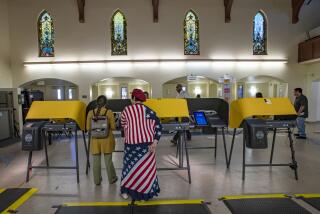Job fair’s hope and despair
The Faith Dome at Crenshaw Christian Center was the perfect venue for Wednesday’s For the People job fair initiative.
It’s not just that it holds 10,000 people -- and almost half of those seats were filled. It’s that something more than logic and reason is required to stoke hope in times like these.
The hopefuls began lining up along Vermont Avenue hours before the church doors opened for the job fair at 9 a.m. Men in pressed slacks and sports jackets, women with high heels peeking from their purses and flip-flops on their feet for standing. A few folks were pushing babies in strollers; one guy was holding the front wheel of the bicycle he had ridden there from Inglewood.
Almost everyone in line was black; all of them clutching briefcases, clipboards or binders, with resumes they hoped to exchange for business cards from would-be employers.
I weaved through a queue that stretched for blocks, asking how they felt and why they had come. One woman seemed to sum it up best: “To fill out applications, leave our resumes and let them know we’re hungry.”
Hungry in a literal way, for some -- those who have been out of work so long, they need food banks and donated clothes to get by.
But I sensed a different kind of hunger in the crowd too -- a need for reassurance that, as a preacher would promise from the pulpit that morning, “You are not going to stay down!”
It was impossible to stand among these folks and not feel profoundly grateful for a job that, most days, I enjoy. I could feel desperation vibrating from the crowd like heat waves from a sun-scorched sidewalk.
And it packed an unexpected emotional wallop. I felt heartsick contemplating all that wasted wisdom and potential -- multiplied city to city, so many times over -- in a nation that can’t afford to discard it.
::
Two hours before the job fair began, I met with LaNordo Conn in the parking lot at the Fijian Motel, a small, scarred stucco complex a mile away, with barred windows and barbed wire.
The motel, Conn’s temporary home, is a long way from where he was two years ago: A six-figure job, a house in Ontario, a Porsche Carrera, “white with blue top,” he tells me.
He makes his fall sound simple enough: He left a steady job at an architectural firm for another that promised to pay much more. Three months later, he was fired. Three months after that, he was homeless. I’m enough of a cynic to believe there is much more to that story.
But the 53-year-old tells it well. He’s compelling and articulate -- tailor-made for the campaign to push legislators to do more to grow jobs for workers like him. He’d like to see a reality show: “ ‘Homeless Congressman.’ They’d have to make it for one week with no money,” he said.
“People living in the mansions eating caviar and having million-dollar weddings ... they don’t get it,” he went on. But it’s not just the millionaires; lots of us don’t get it, because we’re gainfully employed.
The scope of the problem is hard to grasp, until you watch that line of desperate people with spotty resumes relentlessly growing.
Last month, Conn drew the attention of U.S. Rep. Laura Richardson when he told his story at the Inglewood Kitchen Table Summit sponsored by the Congressional Black Caucus. Richardson promised to meet him at the job fair and walk him through the search process.
She gave him a shout-out from the church stage on Wednesday, and had him stand and wave to the crowd. People applauded, as they did every time a politician at the opening rally offered up a story of hope.
The job fair felt like a combination church revival and political summit. The night before, more than 1,000 people tried to crowd into the sanctuary for a Town Hall session with 13 members of the Congressional Black Caucus and civil rights standard Jesse Jackson.
It was, one woman told me later, “like going back to the old days,” pre-Barack Obama; “before black politicians got complacent and forgot they’re the ones that represent us.”
The president who campaigned on hope is presiding instead over hopelessness. And doing little, it seems even to his fans these days, to rectify the economic malaise. The Job Fairs, the Town Halls, the Kitchen Table Summits ... they are all part of a campaign to put political pressure on not just Republicans, but our Democratic president.
But the problems go deeper than hiring numbers. And Richardson acknowledged as much. Neither make-work government jobs nor tax cuts for small business will lift us from this pervasive slump. She and the Congressional Black Caucus are pushing for job training, apprenticeships and pledges from big corporations to hire from deep in the community.
But not everyone thinks politicians have the answer. “There are jobs there, our people just can’t get them,” said one job fair coordinator who works as a compliance officer, checking construction sites on government projects.
She also volunteers with a program that trains the long-term unemployed, who are often hobbled by their own educational deficits and outdated computer skills, or by drug problems and criminal records.
What troubles her, she said, “is you see all these people from other countries come here, and they’re working. And they’re not just getting the low-wage jobs.... But the politicians don’t want to talk about that.”
::
The sheer numbers at the job fair were dispiriting for some. More than 4,000 people looking for jobs, and 150 would-be employers -- heavy on security firms, government agencies and retail companies.
I was pleased to see so many community service programs; agencies that weren’t there to hire but to provide help for job-seekers: counseling, clothing, computer training, help with interviewing skills. And I was disappointed that only a handful - I saw three - had posted “hiring now” signs.
Inside the Faith Dome, job trainer Carrie Marks gave the group a quickie primer: “Focus on ‘hard skills,’ what you know. I have. I can. I am. Think of it as a 30-second commercial to let them know what you bring to the job.” I saw people taking notes around me.
The church people handled it differently. “Today’s your day for victory,” Pastor Fred Price Jr. told the crowd. “You’re gonna get a job today.”
His sister took the stage, and called for prayer. “We want you to be employed when you leave these grounds!”
I headed back to my car, parked at 75th and Vermont, across from a tiny house-turned-church, with a cross marquee: The Promiseland.
Across the street was a row of three others: Iglesia Palabra Viva, First Community Baptist, and Romona’s Gospel and Exhibit Theater. And on the corner, Community Centers Inc., promising “Miracles Happen Here.”
If only faith was all it took.
More to Read
Inside the business of entertainment
The Wide Shot brings you news, analysis and insights on everything from streaming wars to production — and what it all means for the future.
You may occasionally receive promotional content from the Los Angeles Times.










